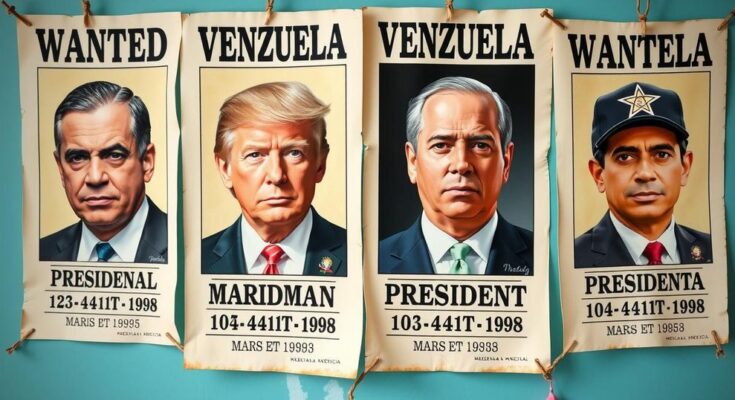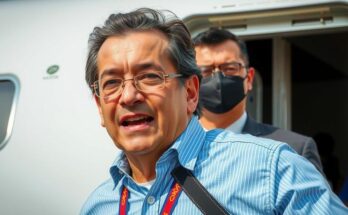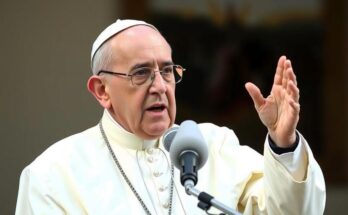Venezuela declared former Mexican presidents Vicente Fox and Felipe Calderón personae non gratae, escalating political tensions due to their support for opposition leader Edmundo González Urrutia. Reports indicate that González declared victory in contested elections, contrary to the government’s claims of Maduro’s win. Venezuelan authorities unveiled wanted posters of the former leaders, alleging conspiracy and threats to national peace, amidst further international scrutiny regarding electoral legitimacy.
Venezuela’s National Assembly has formally declared former Mexican presidents Vicente Fox and Felipe Calderón as personae non gratae, highlighting escalating tensions amid the nation’s ongoing political crisis. This new directive also encompasses seven additional former Latin American presidents who supported opposition leader Edmundo González Urrutia, asserting claims of victory in Venezuela’s controversial 2024 elections, which the government insists were won by the current president, Nicolás Maduro. Recently, Maduro was inaugurated for a third six-year term, solidifying his hold on power, supported by a legislative assembly largely comprised of pro-Maduro representatives.
The assembly’s declaration views these former leaders as unwelcome figures within Venezuelan borders and has ominously indicated intentions to prosecute anyone deemed a “foreign force attempting to invade” the country. Diosdado Cabello, Minister of the Interior, exacerbated the situation by releasing wanted posters featuring the two ex-presidents, accusing them of conspiracy and endangering Venezuela’s peace. These posters are to be circulated across the country, notably in significant transit hubs such as ports and airports.
Fox and Calderón, both affiliated with Mexico’s National Action Party (PAN), have not issued direct statements focusing on the elections in Venezuela but have shown support for González via social media and interviews. Calderón has publicly pledged to accompany González on an upcoming tour across Latin America intended to garner backing for his anticipated swearing-in attempt. The دیگر ex-presidents designated on the list include notable figures such as Mario Abdo of Paraguay, Laura Chinchilla of Costa Rica, and Jorge Quiroga of Bolivia, amongst others.
In response to the electoral developments in Venezuela, the National Electoral Council proclaimed Maduro as the election victor last July. Following this announcement, then-President of Mexico, Andrés Manuel López Obrador, underscored Mexico’s respect for the declared outcome, emphasizing adherence to democratic principles, though he later opted out of an international dialogue regarding the election. González’s legitimacy is affirmed by multiple nations, including the United States, Canada, and Spain, while Maduro receives backing from nations like Russia and China.
Recent credible observations suggest that González commanded a significant majority during the elections; a report indicated he secured victory by a margin exceeding two-to-one. Maduro’s inauguration was attended by several heads of state, but notable absences included Colombian President Gustavo Petro, who cited humanitarian concerns. The Mexican delegation at this event was represented by its ambassador to Venezuela, as Mexican President Claudia Sheinbaum stated that Venezuela’s internal matters lie at the discretion of its populace.
The political landscape in Venezuela has been marked by contention, particularly following the controversial elections that have drawn international scrutiny. The claim of victory by opposition leader Edmundo González Urrutia in contrast to the ruling party’s assertion of Nicolás Maduro’s triumph has amplified existing tensions. The strategies employed by Venezuela’s government to delegitimize foreign leaders and enhance its narrative against perceived threats reflect a broader attempt to consolidate power and suppress dissent. The involvement of former leaders from other Latin American nations highlights the region’s complex political dynamics, where alliances and divergent stances on governance can lead to profound diplomatic rifts.
In summary, Venezuela’s decision to label former Mexican presidents Vicente Fox and Felipe Calderón as unwelcome individuals illustrates the country’s deepening political crisis and strained relations with foreign leaders. The issuance of wanted posters and accusations of conspiracy signify an aggressive attempt by the Maduro administration to quell dissent both domestically and internationally. This move underscores the broader geopolitical tensions concerning recognition and support for opposition figures in the Latin American region.
Original Source: mexiconewsdaily.com




